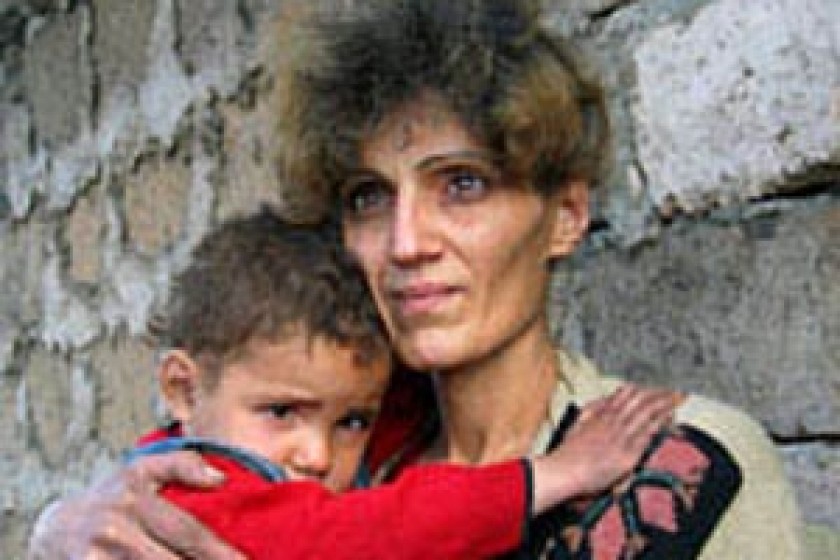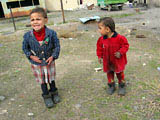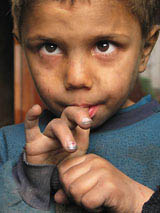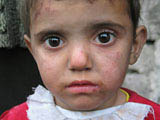
The garbage dump has become a way of life
"My youngest daughter takes a shoe and says, 'Mom, this is raw material.' I say, "Baby, how do I know whether it's raw material or not,'" says Taguhi Adilkhanyan, a mother of four young children. "Here, in the garbage dump, this is the only thing the kids talk about. They discuss what kind of metal they got, which is useful, which is not."
Taguhi and her husband Vardan live with their children in a vacant lot abandoned by a motor depot in the Achapniak district, near the garbage dump. Before coming here, they lived in the Southwest district of Yerevan in an apartment they owned. This apartment was bought for Taguhi by her mother, who does business in Poland , for $8,000. Three years ago Taguhi and her husband borrowed $1,200 to set up their own business. When they couldn't pay off their debt in time, the lender sued them and demanded $2,000, including the accrued interest. The judge put their apartment up for auction. A year later, court executors managed to sell the apartment they had paid $8,000 for, for only $2,000. The family was forced to vacate the apartment. They rented an apartment for a while, but were unable to pay the rent on time, so they now find them themselves here.
"My husband is a driver, he is a car expert. We used to live OK. He lost his driver's license, and now he's jobless. And I barely manage to look after the kids," Taguhi says. They make both ends meet with the support of some relatives and by salvaging scrap metal collected here and there. They salvage mainly copper and aluminum scrap, making 500-600 drams (about a dollar) a day. "A while ago my mother invited us to Poland , but we didn't go. I didn't want to earn my living in a foreign land. But now I regret that very much. There is no law or justice here."
 |
 |
 |
The kids collect scrap, too. "My oldest son is very hard-working. He collects plastic bags. Once I wanted to burn plastic bags to keep the kids warm. He said, 'Why are you burning it, it's worth money?" Taguhi's oldest son Sargis is eight. He has never gone to school. But he knows the Armenian alphabet. Neither Sargis nor other children - five-year-old Hovhannes, four-year-old Lilit, and two-year-old Lilia, are registered. They don't go to school, they're not registered in any polyclinic, none of them has been vaccinated. One of the boys often has fever and fainting spells. They don't have the money to take him to a doctor.
Taguhi dreams that one day her kids will be educated, will at least learn some handicraft. "A couple of times I bought books, they wore them out," Taguhi says, "but in the evenings we play different games. I say to them, 'Now we are going to say words beginning with 'T', or we do addition and subtraction using apples, or we sing songs, recite poems. I want my children to get an education but in these conditions, in this environment it's impossible."
Five-year-old Hovik says he loves to watch movies, but he can't do that now- they don't have electricity. Taguhi recalls that they managed to connect an electricity line from the neighboring village, but electricity network employees forced them to cut it down. They bring water from the Chorrord village. She complains that the kids get dirty a lot and it's a big problem here to get cleaned up or to bathe.
Dust and garbage are familiar things for the kids-they are their playthings, their subject of conversation, and their work. This is their way of life. But Taguhi and her husband are afraid that they will not be allowed to keep even this. "Lately some people have been coming here and demanding that we leave. They say this territory has been privatized, and new buildings will be built here," Taguhi says, "If we don't leave they will evict us, they won't even pay attention to the fact that we have little children."
Lusine Grigoryan
Photos by Onnik Krikorian
 Videos
Videos Photos
Photos




Write a comment